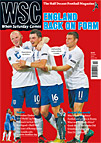 A change in political tactics by the North Korean regime is being enacted through the export of promising footballers, writes John Duerden
A change in political tactics by the North Korean regime is being enacted through the export of promising footballers, writes John Duerden
It was the definition of optimism. The Reuters reporter stood with microphone in hand after North Korea’s 3-0 defeat to Ivory Coast at the 2010 World Cup hoping to catch a word with the vanquished. Every grim-faced player was asked “Do you speak English?” as he filed past. To say the silence was stony would be kind.
Only the last one out was happy to speak. Jung Tae-se made front pages around the world for crying during the national anthem prior to kick-off against Brazil and was equally forthcoming about the reasons why his team lost and what needed to be done in the future before the visibly annoyed team manager came back to drag him on to the bus.
Next time around Jung may still be the lone striker but not the sole speaker. North Korea believe that the best way to ensure that there actually is a next time is to engage with the international football community on a more consistent basis. For a country that is rarely mentioned in the western media without “secretive” somewhere in the headline it is quite a shift, but the World Cup reinforced a growing feeling that isolationism in football is more stupid than splendid if you want success.
Just weeks after the tournament ended, the government split the North Korean FA in two. The larger section deals with international affairs and was put under the control, not of the party but of the military, headed by Kim Jong-il’s heir Kim Jong-un, thought to be more of a fan of basketball than football.
When qualification for the 2014 World Cup starts in September, the majority of the North Korea starting 11 could be foreign-based, travelling home for matches from such destinations as Germany, Japan, Switzerland, Russia and Denmark (and even Mongolia, now the home of Kim Myung-won, the striker who the team tried to register as a goalkeeper last summer). There could even be movement north across the 38th parallel but only when conservative South Korean president Lee Myung-bak, blamed by Pyongyang for most of the problems on the peninsula, steps down in 2013.
By that time striker Ri Myong-jun and midfielder Jong Il-ju will be approaching the end of their contracts with second-tier Danish club FC Vestsjaellend. The players were just 20 when they arrived on trial last year and did enough to be handed lengthier deals. The club chairman had had some contact with North Korea in the past but, even so, the deal was not a simple process, despite the relative enthusiasm for the idea of exporting talent. “It is not an easy country to sign players from,” said coach Micheal Schjonberg. “It’s like in the old East Germany. They are employed by the military, which belongs to the government. Importing exotic animals would be easier with all the bureaucracy but there is talent there.”
Ove Pedersen replaced Schjonberg at the beginning of July and is happy with his Asian contingent. “I don’t know about North Korea’s plan to get more international experience but here the two players are learning to play football in a different style than what they are accustomed to,” he said. “They will develop as players and become more skilful. They pass well and although their shooting could be better they are young and will make progress. Ri is the better player of the two. He is a player for the bench at the moment but that may change soon. Jong has more to learn but that will happen as the good thing about them is that they both work hard and want to learn. It is difficult to communicate with them but they are learning English and doing well in training.”
Having two North Koreans at the same club means that they can support each other off the pitch in a very foreign environment, but they are also trying to fit in with their team-mates. “With foreign players, you can see when the players accept them or don’t accept them,” said Pedersen. “I can see that our players accept them. They are part of the group.”
It is a trend that is going to continue with more North Koreans heading overseas and it is only a matter of time before one arrives in England. When that happens, it doesn’t mean that every North Korean footballer will be desperate to talk to the press but at least journalists will be able to spot the ones that don’t – they’ll be wearing oversized headphones and talking into mobile phones.
From WSC 295 September 2011
 A series of fortunate events helped Al Sadd secure a highly unlikely victory in the Asian Champions League, as John Duerden reports
A series of fortunate events helped Al Sadd secure a highly unlikely victory in the Asian Champions League, as John Duerden reports

